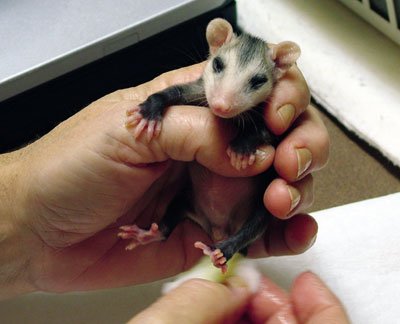Spring means nature is blooming with new life. As warm weather
entices us outside to our gardens and walks in the park, the
chances of encountering wildlife are increased.
Spring means nature is blooming with new life. As warm weather entices us outside to our gardens and walks in the park, the chances of encountering wildlife are increased. Each year, many people find baby birds or mammals and call WERC, the Wildlife Education and Rehabilitation Center, for help. It’s heart warming to see that so many people are concerned for our local wildlife. Sometimes, these good intentions are not necessary because baby animals that appear to be orphaned are being well cared for by their parents. More than 75 percent of young animals that are brought in don’t really need assistance. Hopefully, a little understanding and information will make it easier for people to determine whether the animal they find needs to be rescued or should be left alone.
If you find that a nestling (a bird that is featherless or feathers just starting to come in) is out of the nest, the best thing to do, if conditions allow, is to place the bird back into its nest.
If you see a fledgling (a bird that has feathers with a little bit of down) on the ground, unless it’s injured, leave the bird alone. A fledgling is one that has permanently left the nest and its parents will continue to care for it until it is capable of flight and beyond.
Some animals, such as rabbits and deer, hide their babies from predators while they search for food and will return to feed their babies. Other young animals may appear to be vulnerable but are actually self-sufficient. Leave healthy young wildlife where you find them. If there’s a question, call WERC for advice.
A young animal’s best chance for survival is to be raised by its natural parents. It’s important to make every effort to return the young to its family. Only after all efforts to reunite them have been exhausted should the orphan be removed from the wild and taken to a licensed wildlife center. Don’t try to raise the baby yourself. Laws protect nearly all wild birds and mammals and it’s illegal to care for them without special permits. Proper care and nutrition are crucial to the survival of the baby and a nutritional deficiency can occur within a few days and cost the animal its life. Each animal species and age has its own dietary requirements and an inappropriate diet can kill the animal. Store-bought food formulated for pet birds is not appropriate for wildlife. Watch the live Web-cam of San Jose City Hall’s Peregrine Falcons feeding their three babies and you’ll see just how specialized the diet is for each species.
WERC, the Wildlife Education and Rehabilitation Center, encourages a peaceful coexistence between civilization and our native wildlife through their educational programs and public events, in addition to providing the community with rehabilitation services for orphaned, injured and sick native wildlife. To contact WERC, call (408) 779-9372 or visit www.werc-ca.org.












